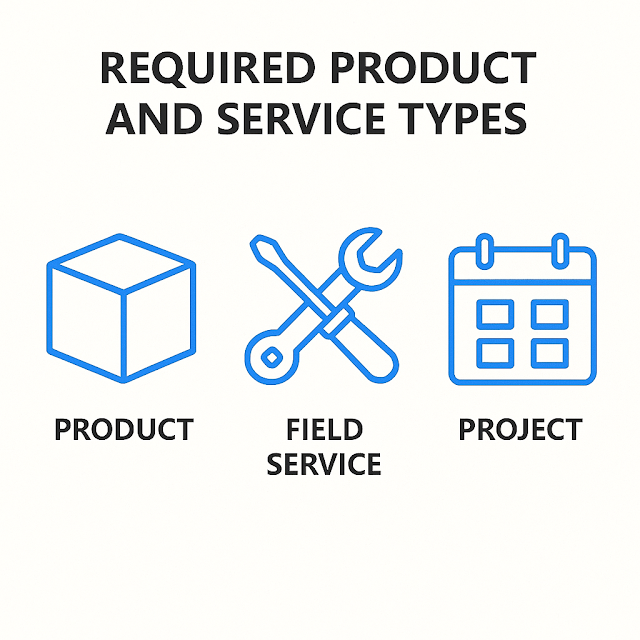Dynamics 365 Field Service : Create and configure required product and service types

In Dynamics 365 Field Service, Product Types and Service Types play a critical role in defining what is delivered to the customer—whether it’s a physical item, a service, or an internally used part. They help standardize work orders, inventory usage, billing, and reporting.
Product Types in Dynamics 365 Field Service
Products are physical goods associated with a work order. Dynamics 365 Field Service supports three types of products:
- Customer Asset (or Equipment)
- Products sold and installed at the customer site.
- Tracked as assets for future maintenance and service history.
- Example: HVAC system, elevator, or router installed at a customer’s premises.
- Inventory
- Parts or materials taken from the company’s warehouse or technician’s van stock.
- Consumption reduces stock levels in real-time.
- Example: Fittings, wires, air filters, or replacement parts.
- Non-Inventory
- Items that do not require tracking in inventory.
- Often used for low-cost or frequently used items.
- Example: Screws, glue, packaging material.
- Accurate inventory management and forecasting.
- Automated asset tracking upon installation.
- Cost calculation and billing accuracy.
Service Types in Dynamics 365 Field Service
Service Types define the labor and technician time associated with a work order. These are essentially predefined service tasks.
Each Service Type can include:
- A description of the task (e.g., “Install water purifier”).
- Estimated duration (e.g., 90 minutes).
- Estimated cost and price.
- Skills required (e.g., Electrical Certification).
- Applicable incident types.
Examples:
- Annual maintenance inspection
- Air conditioning system repair
- IT system diagnostics
Why It’s Important:
- Standardizes recurring service tasks.
- Helps technicians and dispatchers understand time and skill expectations.
- Useful for analytics and SLA performance tracking.
- Reduces manual entry for common services.
Integration with Work Orders
When creating a Work Order:
- Product Types determine what items are required or consumed.
- Service Types define the work to be performed and duration.
- This drives scheduling, inventory updates, time tracking, and billing.
Summary of Importance
- Helps streamline operations with standardized product and service definitions.
- Enhances scheduling accuracy and technician readiness.
- Provides better control over costs, pricing, and margins.
- Supports automation, from work order creation to invoicing and reporting.
Published on:
Learn moreRelated posts
How to Use Copilot to Create Inspection Templates in Dynamics 365 Field Service from PDF and Image Uploads (2025 Guide)
Microsoft’s Dynamics 365 Field Service mobile app empowers field technicians to manage tasks, log inspections, and ensure compliance directly ...
Dynamics 365 Field Service – Tailor Copilot chat experience with Copilot Studio
We are announcing the ability of makers being able to customize their experience of the Copilot side pane by using the customization capabilit...
Fixed – Workflow must be in Published state (Dynamics 365 Field Service)
Recently, we got the following error while booking a resource in our schedule board. We earlier got the same error while trying to delete book...
Workflow must be in Published state while deleting the Bookings / Work Orders (Dynamics 365 Field Service)Workflow must be in Published state
Recently we were cleaning some of the work orders and related records in one of our environments. However when trying to delete the bookable r...
Mastering the Schedule Assistant in Dynamics 365 Field Service
In the dynamic world of field service management, assigning the right technician to the right job at the right time is both a science and an a...
Fix – The FnO Integration solution install failed. HCMScheduling and HCMSchedulingAnchor solutions must be installed. See Field Service documentation for details (Dynamics 365 Field Service)
While trying to install Finance and Operations from Field Service Settings, we might encounter the following error. “The FnO Integration solut...
Unlocking Scheduling Efficiency: A Deep Dive into Schedule Board & Schedule Assistant in Dynamics 365 Field Service
In today’s fast-paced service industry, scheduling the right technician at the right time is key to providing excellent customer service and m...
Study Guide for Exam MB-240: Microsoft Dynamics 365 Field Service Functional Consultant
Microsoft Dynamics 365 Field Service Functional Consultant (MB 240) Skills at a glanceConfigure field service applications (20–25%)Manage...
Dynamics 365 Field Service : Embed apps in Field Service
In today’s fast-paced field service environments, technicians and back-office staff need highly tailored tools to perform their work efficient...
